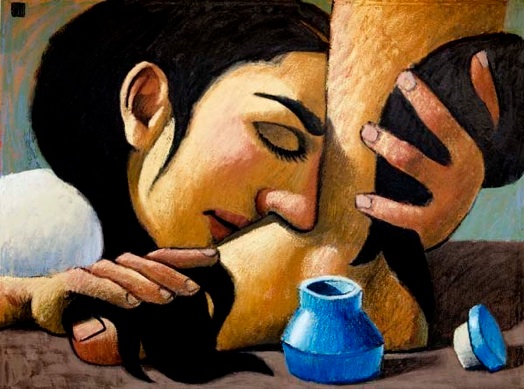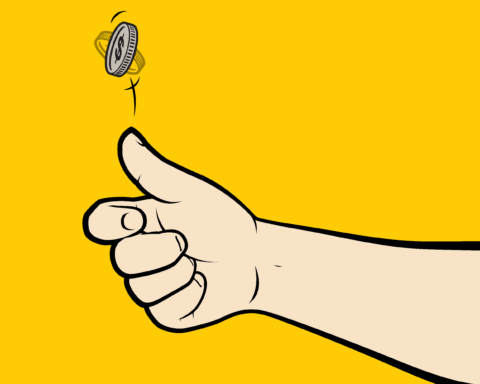
Even before I began to follow Jesus, I viewed radical material simplicity as a mark of holiness. For many years, when I thought about what my ideal life would be, I imagined an existence almost entirely detached from our world’s economic system. I dreamed of shedding all my possessions, living out of my backpack, and traveling the world in search of adventure. By my mid-twenties, I was fairly close to living the dream. Studying at a seminary in a small town in Indiana, I had no car, no health insurance, a critically depleted bank account, and few possessions – some books, a bare minimum of clothing, and an aging laptop computer.
I took pride in how little I could get by on. I disdained money, and couldn’t understand how so many people I knew managed to spend so much and live so high on the hog. The wastefulness I saw was immense, and even in a place as poor as the dying, rust-belt town where I found myself, I lived well enough by scavenging what others threw away. I knew that lots of people wished they had more money, but what I wished most of all was that money didn’t exist in the first place.
Imagine my astonishment when, a couple of years ago, my wife and I realized that God was calling us to buy a house! We hesitated and put the decision off, but this sense of God’s call on our lives only grew stronger. It became clear that we were being asked to put down roots, and that part of this process was the very tangible act of commitment represented by home ownership. It took a while, but we finally did it: We took out a mortgage and bought a lovely house on the east side of the District.
Perhaps these details seem mundane, but for me this process was earth-shattering. Buying a house was a radical life change, and it raised serious theological issues for me. Could I own real estate and be a follower of the homeless, penniless Jesus of Nazareth? Was it “kosher” (so to speak) for us to participate in the economy of interest-bearing debt that our mortgage represented? I wrestled with the irony of our situation: What did it mean that we felt called to buy a house as part of following the Messiah who told another potential follower, “sell everything that you own and give the money to the poor, and then come follow me”?
 The decision to buy our house was a major step in reconsidering how I understand the role of money in my life. I have frequently related to wealth as a sign of decadence and unfaithfulness, and I have felt judgmental toward those whose financial choices have been different from my own. Like Jesus’ earliest followers, I have sometimes had a hard time telling the difference between waste and generosity.
The decision to buy our house was a major step in reconsidering how I understand the role of money in my life. I have frequently related to wealth as a sign of decadence and unfaithfulness, and I have felt judgmental toward those whose financial choices have been different from my own. Like Jesus’ earliest followers, I have sometimes had a hard time telling the difference between waste and generosity.
If anything, I’ve often imitated the bad traits of Jesus’ first disciples. Remember the time at Bethany, when a woman came and poured costly ointment on Jesus’ head as he sat at table? The disciples just about had a fit. “Why this waste?” they asked Jesus. “This ointment could have been sold for a large sum, and the money given to the poor.”
If I had been there, I would have been nodding right along. What the heck was this woman thinking, dumping liquid gold on Jesus’ head? But how did Jesus respond? He rebuked the disciples, and praised the woman as a hero of love economics. “Truly I tell you, wherever this good news is proclaimed in the whole world, what she has done will be told in remembrance of her.”
There’s a tension in my life, just like the tension I find in Jesus’ own life and teachings: On the one hand, wealth can be dangerous, easily turned into an idol and worshiped for its own sake. On the other hand, the risky, lavish use of wealth can also be a means to express commitment, love for others, and total abandon to God’s purposes in our life.
___________________________________________
The dynamics of usury infuse our lives with the very real sense that there is never enough. When we lend, we are compelled to always look for ways to increase our investments. When we borrow, we are forced to find some way to keep up with the unrelenting pace of compound interest.
___________________________________________
Jesus is a teacher who doesn’t dispense easy answers. Rather than offering me a list of rules to follow, he invites me into a living journey with him. Jesus is lord of both cross and wedding banquet. He is creator of both water and wine. The path on which he leads me comes with many twists and turns that continually surprise me, disrupting my life and shaking my expectations of what being his follower is all about.
Each person’s journey is going to be a little different. We all have unique strengths, weaknesses and blind spots. We each need a healer who can speak directly to our condition. For me, as someone has often been self-righteous about my own pretended non-attachment to a fallen economic system, my path to healing involves reevaluating my relationship to money and possessions.
 Looking back now, my forceful refusal to engage with the economy as it exists was probably just as much as a sign of materialism as the conspicuous consumption that I so disdained. My conspicuous non-consumption took on a life of its own, to the point where it was making me more judgmental, less hospitable and less in touch with the experience of my neighbors. I am learning that, for me, the ways that I try to keep control of my life are far more significant than the amount that I have in the bank, or whether I have a mortgage or not.
Looking back now, my forceful refusal to engage with the economy as it exists was probably just as much as a sign of materialism as the conspicuous consumption that I so disdained. My conspicuous non-consumption took on a life of its own, to the point where it was making me more judgmental, less hospitable and less in touch with the experience of my neighbors. I am learning that, for me, the ways that I try to keep control of my life are far more significant than the amount that I have in the bank, or whether I have a mortgage or not.
I see now that my posture of defiance towards wealth has been largely misdirected. I have always been able to sense that there is something profoundly wrong with the way we treat each other in our present economic order. From childhood, I have intuitively known that usury – the charging of interest – is out of line with the way God created the world to be. In our present economy, virtually all of us participate in relationships where one person says to another, I will loan you money, but only if you pay me back even more.
The dynamics of usury infuse our lives with the very real sense that there is never enough. When we lend, we are compelled to always look for ways to increase our investments. When we borrow, we are forced to find some way to keep up with the unrelenting pace of compound interest. In either case, we lose the chance to be gift-givers, to live in a free flow of giving and receiving. Rather than the economy of love that we witness in Acts 2, we spend most of our time living in a world that is founded on the cold calculations of interest rates and repayment plans.
This is a world in which none of us truly need one another. It is a world in which goods and services are interchangeable, devoid of any relationship but that of cash money. This is an economy in which I have no meaningful connection to the people who make my clothes, service my car, or sell my groceries. They provide a service, and I pay them. That is the end of the relationship. I live in a society with an amazing abundance of material goods, yet an appalling scarcity of meaningful connection, community and meaning.[1]
___________________________________________
It would have been easy for me to condemn the woman who poured perfume over Jesus’ head, because so often I fail to understand that more for others does not mean less for me.
___________________________________________
I have rebelled against this world so fiercely that it has often been hard for me to embrace the goodness of creation at all. Ironically, even as I rejected the usurious economy we live in, I failed to escape the basic assumptions of that system. Though I have sought to leave the game altogether, I have ultimately been playing by the same rules. Far too often, I have seen beauty, wealth and abundance in zero-sum terms: More for you is less for me.
It would have been easy for me to condemn the woman who poured perfume over Jesus’ head, because so often I fail to understand that more for others does not mean less for me. Before I can truly come to grips with what was happening in that moment between Jesus and the woman with the perfume, I have to understand that for her, more for Jesus was more for everybody. When she anointed Jesus with that costly perfume, she was blessing the whole world. She understood that there was enough joy, wonder and love to go around. Everyone can have enough, if we choose to open our hearts.
 I’m still very much an infant in this kind of wisdom. I don’t know how to love others – or myself – nearly as well as that woman knew how to love Jesus. But I want to learn. Whether it is buying a house in a neighborhood where God is calling us to make a life, feeding the hungry with food saved from being thrown away, or giving financial support to women and men called to ministry, I want my life to reflect the abundance and fearless love of Jesus. How can my choices about how to spend my time, energy, resources – and, yes, money – help to make visible the Spirit-led community that we catch a glimpse of in the second chapter of Acts?
I’m still very much an infant in this kind of wisdom. I don’t know how to love others – or myself – nearly as well as that woman knew how to love Jesus. But I want to learn. Whether it is buying a house in a neighborhood where God is calling us to make a life, feeding the hungry with food saved from being thrown away, or giving financial support to women and men called to ministry, I want my life to reflect the abundance and fearless love of Jesus. How can my choices about how to spend my time, energy, resources – and, yes, money – help to make visible the Spirit-led community that we catch a glimpse of in the second chapter of Acts?
It won’t be through a denial of the goodness of the material world. It can’t be through a clutching, self-centered piety or asceticism that distances us from beauty, abundance and hospitality. Instead, Christ is inviting us into a new world that is fully rooted in the richness of the creation and human relationships. As we partner with the Holy Spirit in caring for this good earth and loving one another, we have access to a joy that releases us from the fear-based, usury economics that we have long taken for granted.
Will you take my hand and walk with me in this new, yet ancient way? I know that we can get there, together.
[1] For a further exploration of many of these ideas, I recommend Charles Eisenstein’s Sacred Economics.
AUTHOR BIO: Micah Bales is a founding member of the Friends of Jesus Fellowship, a network of communities and ministries gathered around a common experience of Jesus in our midst. He blogs regularly at The Lamb’s War, and has been published in a variety of online and print publications. Micah lives together with his wife in Washington, DC.Read more articles in this series.






Unbound Social